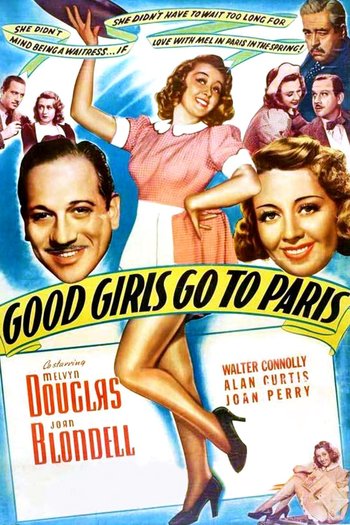
Good Girls Go to Paris is a 1939 American romantic comedy film directed by Alexander Hall, starring Melvyn Douglas and Joan Blondell.
Jenny Swanson (Blondell), a waitress on the college campus of a small town, confides to English Professor Ronald "Ronnie" Brooke (Douglas) that her dream is to go to Paris by any means necessary. After he tells her that he's going to New York City, she goes to the city, where she meets Brooke's future in-laws, the wealthy Brand family. Jenny ingrates herself into the family and seems on her way to landing a rich suitor, but her conscience and her heart may lead her in another direction.
This film features examples of:
- Ambulance Chaser: A sleazy lawyer shows up at the mansion basically demanding a payment for the guy that Dennis hit with a car. Olaf actually calls him an "ambulance chaser."
- Breach of Promise of Marriage: Jenny enjoys seeing a picture of a woman who won a hundred thousand dollars in a breach-of-promise suit and who used the money to go to Paris. She tries to engineer this herself but can't due to an attack of conscience.
- Calling the Old Man Out: Jenny ends up calling Olaf out for being so mean to his family to the point that they don't discuss their problems with him.
- Curious Qualms of Conscience: Jenny actually had the letters that would have earned her a breach-of-promise payoff, but didn't produce them, because of "a flutter" in her stomach. Ronnie tells her that was her conscience.
- Dramatic Irony: All the students joke about how the Greek philosophy class is probably "a pushover" and the professor is no doubt an "old fluff" with a long white beard. They say this directly to Ronald, whom they take to be a gra student.
- Gold Digger:
- Jenny isn't ashamed to admit to be okay with some gold-digging in her way to the top, though it's clear that she still has a conscience to be a clear-cut example. She cheerfully admits this to Tom Brand.
Jenny: Are you sure you're rich?
Tom: Well my grandfather just gave away another million. Of course he can take it off his income tax.
Jenny: [come-hither look] Oh Tom, you have such nice blue eyes.- Paul is a male example, as Jenny discovers that he's after Catherine only for her wealth.
- Grumpy Old Man: Olaf, the grandfather of the Brand family, is quite cantankerous. Everybody is surprised with Jenny manages to gain his sympathy, but even then she ends up being the one to call him out for being so mean to his family.
- Leg Focus: Jenny isn't afraid to show off her legs, like when she shortened the skirt of her waitress uniform in order to show her knees, which sometimes can cause a ruckus.
- No Indoor Voice: Olaf the family patriarch delivers all his dialogue at a yell.
- Pair the Spares: In the end, when everything is straightened out and Jenny gets Ronnie, Olaf gives his consent for Sylvia to be with Dennis.
- Romantic False Lead: Tom, Sylvia's brother, who gets engaged with Jenny, but at the end it becomes obvious that he graciously takes a step aside so she can be with Ronnie.
- Sexy Backless Outfit: Joan Blondell was more or less contractually obligated to wear such dresses in the 1930s, and she's wearing one here in the climactic party scene where Jenny has to face her feelings.
- Title Drop: When Jenny confides to Ronnie that she isn't above a little gold-digging and blackmail to achieve her dream, he tries to dissuade her, telling her that "good girls go to Paris, too".
- Uptown Girl: Jenny lears that Ronnie's fiancée Sylvia is actually in love with Dennis, but fears being disinherited by her very wealthy grandfather if they married because Dennis is the son of the family butler.
- Waiting for a Break: Jenny works as a waitress on a college campus while coming up with a way to realize her dream to going to Paris.
